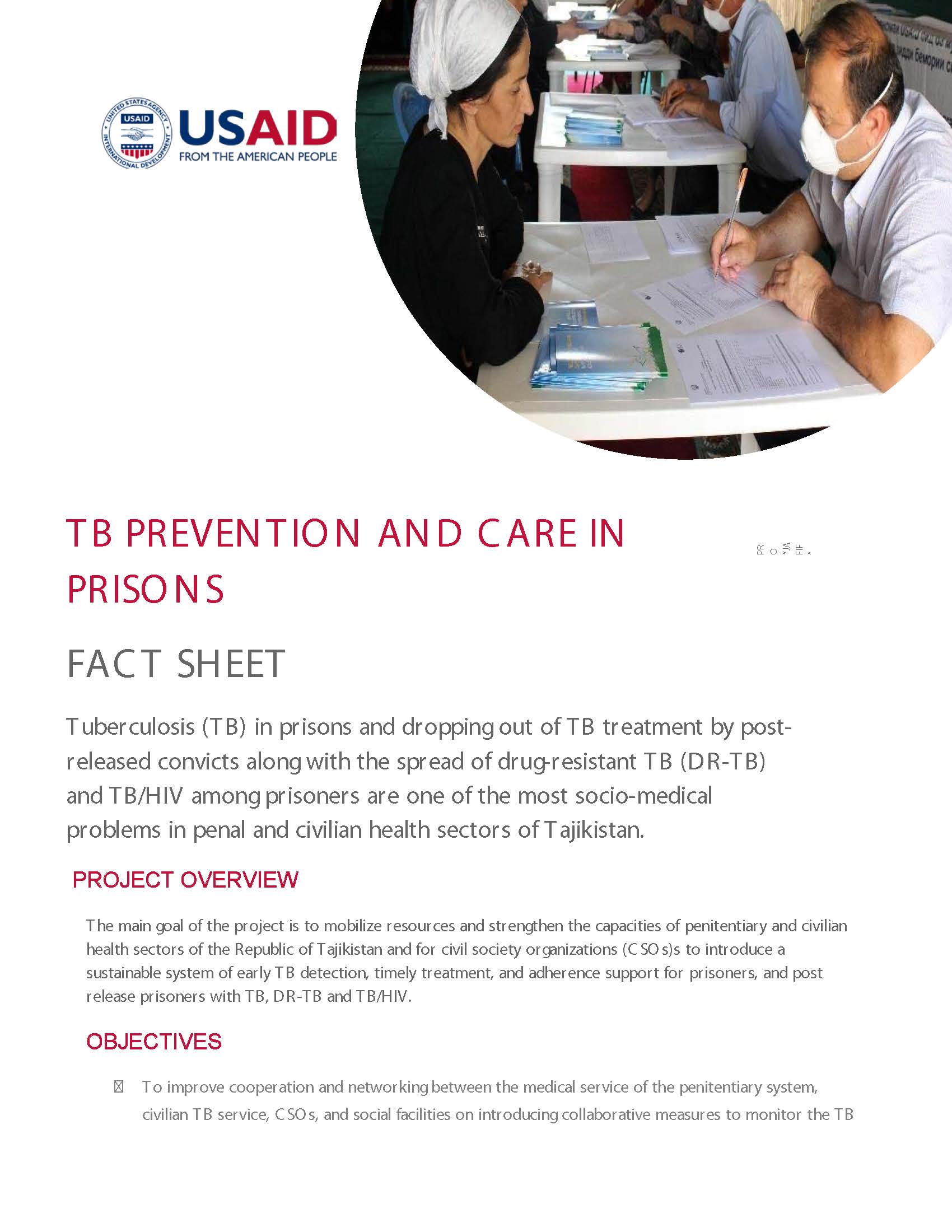Speeches Shim
TB Prevention and Care in Prisons Fact Sheet ![]() (pdf - 162k)
(pdf - 162k)
Tuberculosis (TB) in prisons and dropping out of TB treatment by post-released convicts along with the spread of drug-resistant TB (DR-TB) and TB/HIV among prisoners are one of the most socio-medical problems in penal and civilian health sectors of Tajikistan.
PROJECT OVERVIEW
The main goal of the project is to mobilize resources and strengthen the capacities of penitentiary and civilian health sectors of the Republic of Tajikistan and for civil society organizations (CSOs)s to introduce a sustainable system of early TB detection, timely treatment, and adherence support for prisoners, and post release prisoners with TB, DR-TB and TB/HIV.
OBJECTIVES
-
To improve cooperation and networking between the medical service of the penitentiary system, civilian TB service, CSOs, and social facilities on introducing collaborative measures to monitor the TB situation and early TB detection in prisons, to deliver continued and result-oriented TB care, and to support prisoners and post released prisoners on TB, DR-TB and TB/HIV treatment.
-
To develop the capacities of medical and non-medical prisons workers, civilian TB specialists, and outreach and social workers of CSOs in delivering TB education, organize regular TB screening, further TB diagnostic and initiation of timely treatment of TB.
-
To arrange long-term cooperation between prisons administrations, civilian TB services and CSOs in joint organization of TB education sessions among newly convicted prisoners and non-medical prisons workers, providing peer-to-peer and individual TB counseling, prevent TB and fight against TB related, gender based and social stigma in prisons and outside of prisons.
CHALLENGES AND SOLUTIONS
The critical barriers interfering in the stabilization of the TB situation in penitentiary system of Tajikistan are:
-
Weak regulatory mechanisms of coordination at the oblast (regional) and local levels, insufficient integration and unstable interaction between the medical service of the penitentiary system, civilian TB centers and CSOs.
-
Casual information exchange between penitentiary and civilian health services to manage and follow up of patients on TB treatment.
-
Lack of knowledge of prisoners about TB and its curability, fear among prisoners to apply for TB care and weak basic knowledge about TB among non-medical prison workers.
-
Insufficient level of preparedness of medical personnel.
-
Lack of approach to organizing regular TB screening, problems with timely transportation of the sputum samples for examination in the central TB laboratory of the penitentiary system or to civilian TB laboratories.
-
Low motivation and adherence to TB treatment among TB, DR-TB, HIV/TB patients.
-
Social problems of former prisoners (“non-tuberculosis” priorities).
-
Stigma and discrimination of TB patients in prisons.
EXPECTED RESULTS
To reach its goal of reduced TB in prisons, the project expects to achieve the following results:
-
The burden of TB, DR-TB and TB/HIV in Tajikistan's prisons has been reduced by equipping the prison and civilian health sectors with effective approaches to TB control and the provision of coordinated and continuous patient-focused services to prisoners with TB, DR-TB and TB/HIV.
-
Medical service of the penitentiary system, civilian TB service, CSO and social facilities have introduced collaborative measures to monitor the TB situation and early TB detection in prisons and delivery continuum TB care for prisoners and post release prisoners on TB, DR-TB and TB/HIV treatment.
-
Medical and non-medical prisons workers, civilian TB specialists, and outreach and social workers of CSOs can control TB in prisons including regular TB screening, further TB diagnostic and in cooperation with the National TB Program (NTP), initiate and manage treatment of TB in prisons in a timely manner.
-
The evidence based practices of CSOs on organization of TB education sessions among newly convicted prisoners and non-medical prisons workers, providing peer-to-peer and individual TB counseling with emphasis on specific gender needs are introduced in prisons and endorsed by the penitentiary system and NTP.
PROJECT DURATION
January 15, 2020 – January 14, 2025
REGIONAL BUDGET
$1,000.000
IMPLEMENTING ORGANIZATION
Republican Public Organization “Afif”
CONTACTS
Lola Yuldasheva, USAID/CA Tajikistan, Agreement Officer Representative
E-mail: lyuldasheva@usaid.gov


Comment
Make a general inquiry or suggest an improvement.